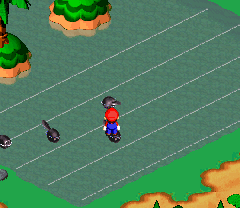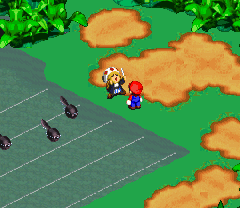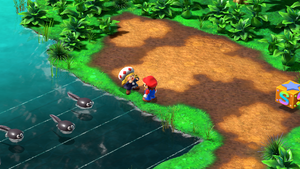Melody Bay
| Melody Bay | |
|---|---|
 Mario in Melody Bay in Super Mario RPG: Legend of the Seven Stars | |
| First appearance | Super Mario RPG: Legend of the Seven Stars (1996) |
| Latest appearance | Super Mario RPG (Nintendo Switch) (2023) |
| Greater location | Tadpole Pond |
| Inhabitants | Toadofsky, tadpoles |
Melody Bay is a part of Tadpole Pond in Super Mario RPG: Legend of the Seven Stars. It is home to the composer Toadofsky. Mario can play music here by jumping across on tadpoles. The bay has lines like a musical staff, and the position of a tadpole when Mario jumps on it determines what note is played. The notes are designed in the treble clef, and each note is named after solfège on the C major scale. From top to bottom, the notes are Mi, Re, Do, Ti, La, So, and Fa. Tunes played in Melody Bay are always eight notes long.
Mario, Luigi, and Toad briefly visit Melody Bay in Mario and the Incredible Rescue to retrieve one of the six Mushrooms from Toadofsky (called "Toadofski" in the book).
Four songs for Toadofsky[edit]
Frog Sage's suite no. 18[edit]
- “Sounds. Laughter. Mirth. Revelry. Donuts. Reading. Dolphins. Relax.
-A few notes on my latest tune.” - —Sign behind the Frog Sage, Super Mario RPG
The Frog Sage's suite no. 18, originally known as Frogfucius' suite #18, is the first song to be played for Toadofsky at Melody Bay. Mario can read the poster at the Frog Sage's study or talk to the tadpole by the entrance to Melody Bay, who will give hints to other songs. The correct notes are So, La, Mi, Re, Do, Re, Do, and Re. After Mario plays the correct notes back to Toadofsky, he rewards Mario with the Alto Card.
Moleville Blues[edit]
- “Diggin' deep in the "MI"nes~ "DO"n't get much sun!~ I'm covered with "SO"il~ 'till my workday is "DO"ne~ I "RE"ally hate sittin'~ It's "LA"bor I choose~ 'cause then's the "TI"me~ To "DO" them old Moleville blues!~”
- —A mole singing the Moleville Blues, Super Mario RPG: Legend of the Seven Stars
After the player saves Dyna and Mite when adventuring to Moleville, going back into the area that Croco destroyed reveals several workers. They want to sing a song, and hidden in the lyrics are the notes to the Moleville Blues, which are Mi, Do, So, Do, Re, La, Ti, and Do. When this is played for Toadofsky, Mario earns the Tenor Card.
Monstro Town Star's Song[edit]
Upon Mario's first arrival to Monstro Town, when he goes in the house where the Monstermama lives, upstairs is a Starslap. If Mario tries talking to it, it will dance a little and play a short melody that sounds like the tadpoles at Melody Bay. This is the third and final song. While the notes do not appear onscreen, the player may identify the pitch by listening to the melody. There is also a musical score to the left of the Starslap that indicates where the tadpoles should be. The correct notes for the Monstro Town Star's Song[1] are La, Ti, Do, Re, So, Do, Re, and Mi. Playing this song correctly for Toadofsky rewards Mario with the Soprano Card.
Mario and Toadofsky's original composition[edit]
When Mario completes all three songs for Toadofsky, he asks Mario to compose an ending for the song. At this point, Mario can use any of the eight notes available to compose an ending for Toadofsky's song. The final composition will be a collaboration of all three songs put together with Mario's composed finish piece. Mario can change this ending anytime he wants to do so.
Given items[edit]
There are three items found in Melody Bay, and they are given by Toadofsky after Mario helps him with his compositions:
| Item | Image | Availability | Location image | |
|---|---|---|---|---|
| Original | Remake | |||
| Alto Card | After talking with the Frog Sage for the first time. | |||
| Tenor Card | After saving Dyna and Mite in Moleville. | |||
| Soprano Card | After interacting with Starslap upstairs of the Monstermama's house in Monstro Town. | |||
Gallery[edit]
Names in other languages[edit]
| Language | Name | Meaning | Notes |
|---|---|---|---|
| Japanese | メロディ・ベイ[2] Merodi Bei |
Melody Bay | |
| Chinese (Simplified) | 旋律海湾[3] Xuánlǜ Hǎiwān (Mandarin) Syùhnléut Hóiwāan (Cantonese) |
Melody Bay | |
| Chinese (Traditional) | 旋律海灣[4] Xuánlǜ Hǎiwān (Mandarin) Syùhnléut Hóiwāan (Cantonese) |
Melody Bay | |
| Dutch | Melodiebaai[5] | Melody Bay | |
| French | Baie Mélodie[6] | Melody Bay | |
| German | Melodienbucht[7] | Melody Bay | |
| Italian | Baia Melodia[8] | Melody Bay | |
| Korean | 멜로디 베이[9] Mellodi Bei |
Melody Bay | |
| Spanish | Bahía Melodía[10] | Melody Bay |
References[edit]
- ^ Special Items S-T. Nintendo: Super Mario RPG Strategy (American English). Archived February 24, 1998, 20:21:19 UTC from the original via Wayback Machine. Retrieved September 15, 2016.
- ^ 「メロディ・ベイ」– World Map. Super Mario RPG. Nintendo (Japanese). Retrieved March 5, 2019.
- ^ "旋律海湾" – World Map. Super Mario RPG. Nintendo (Simplified Chinese). Retrieved October 13, 2025.
- ^ 「旋律海灣」– World Map. Super Mario RPG. Nintendo (Traditional Chinese). Retrieved October 13, 2025.
- ^ "Melodiebaai" – World Map. Super Mario RPG. Nintendo (Dutch). Retrieved March 25, 2024.
- ^ « Baie Mélodie » – World Map. Super Mario RPG. Nintendo (French). Retrieved November 18, 2023.
- ^ „Melodienbucht“ – World Map. Super Mario RPG. Nintendo (German). Retrieved November 17, 2023.
- ^ «Baia Melodia» – World Map. Super Mario RPG. Nintendo (Italian). Retrieved December 3, 2023.
- ^ "멜로디 베이" – World Map. Super Mario RPG. Nintendo (Korean). Retrieved March 25, 2024.
- ^ "Bahía Melodía" – World Map. Super Mario RPG. Nintendo (Spanish). Retrieved November 18, 2023.


